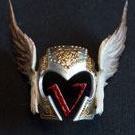
-
entries
2,641 -
comments
9,842 -
views
182,901
About this blog
Featuring everything new and experienced authors need to develop creative and technical skills. Check out writing development articles, our Word of the Day, writing prompts, anthology opportunities and more!
Entries in this blog
Venting Machine
Roads Less Travelled - The Genre Edition
Grammar Guide 20 - More on Sentences

Myr in Grammar Guide
Genre Fatigue
Prompt May 13th
Grammar Guide 19 - More Clauses

Myr in Grammar Guide








